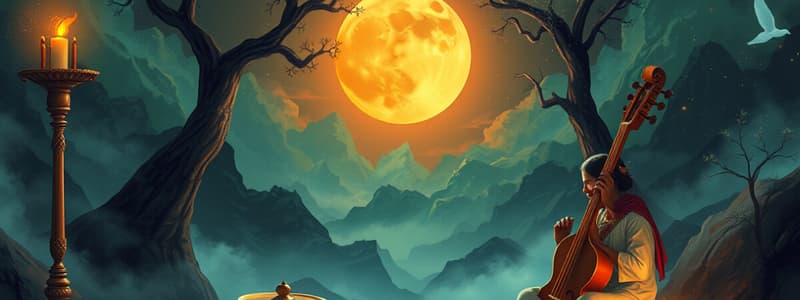Podcast
Questions and Answers
What is a raga?
What is a raga?
- A instrument
- A scale based on a set of notes (correct)
- A song
- A type of dance
What does a sitar do in Indian classical music?
What does a sitar do in Indian classical music?
Plays the main melody
How many strings does a tambura usually have?
How many strings does a tambura usually have?
4 to 6 strings
What are the two drums in a tabla called?
What are the two drums in a tabla called?
A _____ is a long held note provided by instruments like the tambura.
A _____ is a long held note provided by instruments like the tambura.
What is a tala?
What is a tala?
What is the structure section 'alap' defined as?
What is the structure section 'alap' defined as?
What happens in the jhor section of a raga?
What happens in the jhor section of a raga?
Describe the jhala section of a raga.
Describe the jhala section of a raga.
What is the gat (or bandish) in Indian classical music?
What is the gat (or bandish) in Indian classical music?
What is a microtone?
What is a microtone?
What is a surbahar?
What is a surbahar?
What is a sarod?
What is a sarod?
How is a sarangi played?
How is a sarangi played?
What is a bansuri?
What is a bansuri?
What type of instrument is a shehnai?
What type of instrument is a shehnai?
What is the function of a harmonium?
What is the function of a harmonium?
What is a shuddh note?
What is a shuddh note?
What is a tivra note?
What is a tivra note?
What is a komal note?
What is a komal note?
What is a matra?
What is a matra?
What does 'sam' refer to in tala?
What does 'sam' refer to in tala?
What is the equivalent of a bar in western music called in Indian classical music?
What is the equivalent of a bar in western music called in Indian classical music?
What does meend refer to in the context of sitar playing?
What does meend refer to in the context of sitar playing?
What is a gharana?
What is a gharana?
What is Indian classical music described as?
What is Indian classical music described as?
What raga is associated with night-time used in the rainy season?
What raga is associated with night-time used in the rainy season?
Flashcards are hidden until you start studying
Study Notes
Indian Classical Music - Raga
-
Raga: A musical scale consisting of 5 to 8 notes; creates specific moods or themes; performed during specific times/seasons; utilizes microtones.
-
Sitar: Prominent string instrument in Indian classical music, similar to a guitar; features an adjustable fret system; typically has 7 main strings and additional sympathetic strings.
-
Tambura: A string instrument with 4 to 6 strings; provides a drone note, enhancing harmony; acts as a supportive accompaniment to the sitar.
-
Tabla: A pair of hand-played drums; consists of the smaller dayan (right-hand drum) and larger bayan; plays a key role in establishing the tala (rhythm).
-
Drone: A sustained note, usually produced by the tambura or harmonium, serves as a musical foundation in performances.
-
Tala (or tal): A rhythmic pattern with numerous variations; includes subdivisions known as vibhags; incorporates spoken syllables like dhin, na, and ta for rhythm.
-
Alap: The introductory section of a raga; characterized by a free-form exploration of the scale without rhythmic accompaniment.
-
Jhor: The second section of a performance, where music starts to accelerate and establishes a steady rhythm.
-
Jhala: Represents the third section, marked by faster tempos and heightened excitement in the music.
-
Gat (or bandish): The concluding section where the tabla joins in; features thematic improvisation and interactive musical dialogue among performers.
-
Microtone: Intervals smaller than a semitone, crucial for the unique tonal qualities of Indian classical music.
-
Surbahar: A bass version of the sitar, commonly used for lower pitches.
-
Sarod: A fretless string instrument; tends to have a sharper sound than the sitar.
-
Sarangi: Similar to the sitar but played with a bow; known for its emotive expressiveness.
-
Bansuri: A traditional bamboo flute; recognized for its airy tonal qualities.
-
Shehnai: A double-reeded wind instrument, comparable to an oboe; often played at weddings and celebratory events.
-
Harmonium: A keyboard instrument resembling an accordion; sound produced by pumping air through hand bellows.
-
Shuddh: Refers to a natural note within a raga's scale.
-
Tivra: Indicates a sharp note in the scale.
-
Komal: Denotes a flat note in a raga.
-
Matra: The measurement of beats within a tala.
-
Sam: Represents the first beat of the tala, marking the start of rhythmic cycles.
-
Vibhag: The division in tala, akin to a measure in Western music.
-
Meend: Refers to the technique of bending pitches on the sitar strings for expressive melodic phrases.
-
Gharana: A traditional lineage or school of music teaching focusing on specific styles of raga and tala.
-
Indian Classical Music - Raga: A rich traditional music form from Northern India characterized by intricate ragas and rhythmic talas.
-
Rag Desh: A specific raga associated with the night and typically performed during the rainy season, evoking a tranquil atmosphere.
Studying That Suits You
Use AI to generate personalized quizzes and flashcards to suit your learning preferences.




